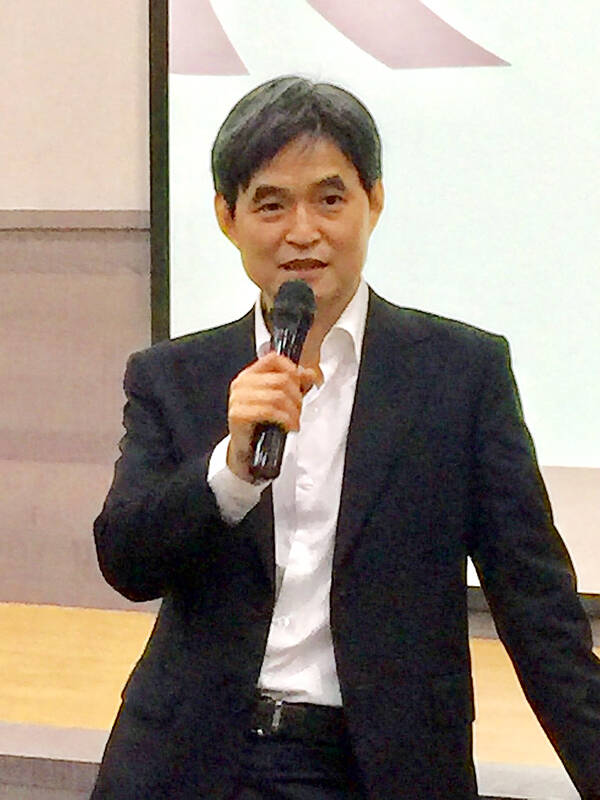Semiconductor component distributor WT Microelectronics Co (文曄) plans to fully acquire Canadian rival Future Electronics Inc in a US$3.8 billion deal, the company said yesterday.
If approved by regulators in Taiwan and abroad in the first half of next year, the transaction would be the largest since Micron Technology Inc absorbed DRAM chipmaker Inotera Memories Inc (華亞科技) for NT$132.6 billion in 2016.
WT Microelectronics expects the deal to expand its reach to the US and European markets while broadening its product offerings and customer coverage, as both companies complement each other in terms of customer bases, product portfolios and geographical deployments, it said.

PHOTO: GRACE HUNG, TAIPEI TIMES
“The acquisition marks a milestone for WT Microelectronics in expanding our global footprint,” chairman Eric Cheng (鄭文宗) told a news conference in Taipei yesterday.
WT Microelectronics’ deal would close its competitive gap with the world’s two largest semiconductor component suppliers, Arrow Electronics Inc and Avenet Inc, Cheng said, adding that the merged entity would have annual revenue surpassing US$24 billion.
WT Microelectronics distributes more than 10,000 products to Asian countries, while Future Electronics offers as much as 150,000 products to customers in regions from Europe and America to Asia, he said.
“The deal would virtually double WT Microelectronics’ customer base,” he said.
The company aims to improve its geographic diversification and reduce its reliance on Asian market, Cheng said, expecting revenue contribution from Asia to account for 57 percent of the total, with 16 percent from Europe and 27 percent from the US.
Last year, 67 percent of Future Electronics’ revenue came from higher-margin components used in industrial, automotive and communications devices, whereas WT Microelectronics only had a 35 percent revenue contribution from those three segments, Cheng said.
That allowed Future Electronics to deliver a better gross margin of 20.1 percent compared with 3.5 percent for WT Microelectronics, he said, while expecting that the company’s profitability and revenue to see a significant enhancement within the first year with the Canadian firm.
Montreal-based Future Electronics manages 170 operations in 47 countries, and has 5,200 employees worldwide. The company would operate independently after the deal has been closed next year.
WT Microelectronics plans to use a loan from DBS Bank Ltd and proceeds from the issuance of 1.35 billion special shares to fund the deal.

SECTOR LEADER: TSMC can increase capacity by as much as 20 percent or more in the advanced node part of the foundry market by 2030, an analyst said Taiwan Semiconductor Manufacturing Co (TSMC, 台積電) is expected to lead its peers in the advanced 2-nanometer process technology, despite competition from Samsung Electronics Co and Intel Corp, TrendForce Corp analyst Joanne Chiao (喬安) said. TSMC’s sophisticated products and its large production scale are expected to allow the company to continue dominating the global 2-nanometer process market this year, Chiao said. The world’s largest contract chipmaker is scheduled to begin mass production of chips made on the 2-nanometer process in its Hsinchu fab in the second half of this year. It would also hold a ceremony on Monday next week to

TECH CLUSTER: The US company’s new office is in the Shalun Smart Green Energy Science City, a new AI industry base and cybersecurity hub in southern Taiwan US chip designer Advanced Micro Devices Inc (AMD) yesterday launched an office in Tainan’s Gueiren District (歸仁), marking a significant milestone in the development of southern Taiwan’s artificial intelligence (AI) industry, the Tainan City Government said in a statement. AMD Taiwan general manager Vincent Chern (陳民皓) presided over the opening ceremony for the company’s new office at the Shalun Smart Green Energy Science City (沙崙智慧綠能科學城), a new AI industry base and cybersecurity hub in southern Taiwan. Facilities in the new office include an information processing center, and a research and development (R&D) center, the Tainan Economic Development Bureau said. The Ministry

ADVERSARIES: The new list includes 11 entities in China and one in Taiwan, which is a local branch of Chinese cloud computing firm Inspur Group The US added dozens of entities to a trade blacklist on Tuesday, the US Department of Commerce said, in part to disrupt Beijing’s artificial intelligence (AI) and advanced computing capabilities. The action affects 80 entities from countries including China, the United Arab Emirates and Iran, with the commerce department citing their “activities contrary to US national security and foreign policy.” Those added to the “entity list” are restricted from obtaining US items and technologies without government authorization. “We will not allow adversaries to exploit American technology to bolster their own militaries and threaten American lives,” US Secretary of Commerce Howard Lutnick said. The entities

Minister of Finance Chuang Tsui-yun (莊翠雲) yesterday told lawmakers that she “would not speculate,” but a “response plan” has been prepared in case Taiwan is targeted by US President Donald Trump’s reciprocal tariffs, which are to be announced on Wednesday next week. The Trump administration, including US Secretary of the Treasury Scott Bessent, has said that much of the proposed reciprocal tariffs would focus on the 15 countries that have the highest trade surpluses with the US. Bessent has referred to those countries as the “dirty 15,” but has not named them. Last year, Taiwan’s US$73.9 billion trade surplus with the US